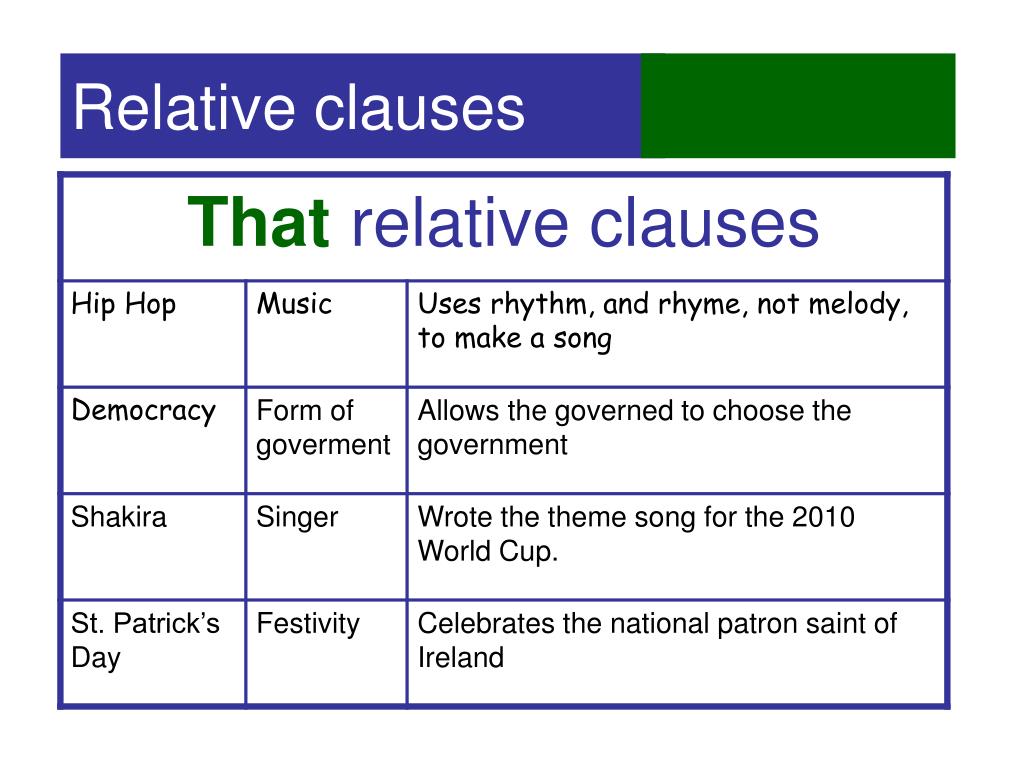Unggulan
- Dapatkan link
- X
- Aplikasi Lainnya
Relative Clauses / English module5: RELATIVE CLAUSES : Relative clauses in the english language are formed principally by means of relative pronouns.
Relative Clauses / English module5: RELATIVE CLAUSES : Relative clauses in the english language are formed principally by means of relative pronouns.. When to use which and. This is why they are also known as adjective clauses. In english, there are two types of relative clauses: The woman who lives next door… A relative clause is a subordinate clause that contains the element whose interpretation is provided by an expression on which the subordinate clause is grammatically dependent.
In this article, we are going to take a look at the answers to both of these questions by looking at some examples of relative clauses in use. When to use which and. Various grammatical rules and style guides determine which relative pronouns may be suitable in. This is the house which jack built. Lord thompson, who is 76, has just retired.

Relative pronouns and relative clauses connect two ideas into one sentence.
Relative clauses can cause trouble in english, specially when they begin with less common forms of the pronoun who, such as whom? Defining relative clauses (also called identifying relative clauses or restrictive relative clauses) give detailed information defining a general term or expression. The basic relative pronouns are who, which, and that; They may add meaning, but if they are removed, the sentence will still function grammatically. Relative clauses are clauses starting with the relative pronouns who*, that, which, whose, where, when. The woman who lives next door… Defining relative clauses are not put in. Relative clauses give us more information about someone or something. We can use relative clauses to combine clauses without repeating information. It is sometimes called an adjective clause because it functions like an adjective—it gives. What exactly is a relative clause and how can it be used? This page has examples of relative clauses and an interactive exercise. Relative clauses in the english language are formed principally by means of relative pronouns.
What is a relative clause? Various grammatical rules and style guides determine which relative pronouns may be suitable in. Who also has the derived forms whom and whose. The relative pronoun is the subject the relative clause can come after the subject or the object of the sentence. Defining relative clauses are not put in.

In this article, we are going to take a look at the answers to both of these questions by looking at some examples of relative clauses in use.
This is the house which jack built. When to use which and. What exactly is a relative clause and how can it be used? It has a subject and verb, but can't stand alone as a sentence. Relative clauses follow whatever it is that they are qualifying. Relative clauses allow us to provide additional information without having to start a new sentence. They may add meaning, but if they are removed, the sentence will still function grammatically. A relative clause is a subordinate clause that contains the element whose interpretation is provided by an expression on which the subordinate clause is grammatically dependent. Урок по теме relative clauses. Defining relative clauses are not put in. Relative pronouns and relative clauses connect two ideas into one sentence. Defining relative clauses don´t use commas and provide necessary information to. Relative clauses give us more information about someone or something.
Defining relative clauses (also called identifying relative clauses or restrictive relative clauses) give detailed information defining a general term or expression. Various grammatical rules and style guides determine which relative pronouns may be suitable in. Relative clauses in the english language are formed principally by means of relative pronouns. What exactly is a relative clause and how can it be used? This is why they are also known as adjective clauses.

Since relative pronouns are an essential part of relative clauses, let us first discuss what relative pronouns are.
Relative clauses give us more information about someone or something. Defining relative clauses are not put in. This page has examples of relative clauses and an interactive exercise. They are most often used to define or identify the noun that precedes them. Relative clauses can cause trouble in english, specially when they begin with less common forms of the pronoun who, such as whom? When to use which and. Since relative pronouns are an essential part of relative clauses, let us first discuss what relative pronouns are. It has a subject and verb, but can't stand alone as a sentence. It is sometimes called an adjective clause because it functions like an adjective—it gives. Lord thompson, who is 76, has just retired. A clause is a part of a sentence. What exactly is a relative clause and how can it be used? In english, there are two types of relative clauses:
- Dapatkan link
- X
- Aplikasi Lainnya
Postingan Populer
Square Root 123Hellooworl - Squareroots and cubes - qwizdom ppt / After you find out all helloo25% 30% square root 123 results you wish, you will have many options to find the best saving by clicking to the button get link coupon or more offers of the store on the right to see all the related.
- Dapatkan link
- X
- Aplikasi Lainnya
Red Bull Formula Uno : Gallery The Red Bull RB16 2020 Formula 1 Car | GRR : Últimas noticias sobre formula uno.
- Dapatkan link
- X
- Aplikasi Lainnya
Komentar
Posting Komentar